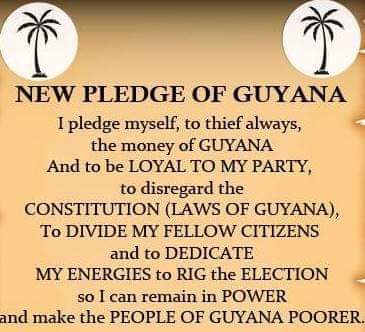April 7 2019
Dear Editor,
Does the Guyana Constitution permit Charandass Persaud to defect from the APNU+AFC coalition and vote with the PPP/Civic? My answer: 1.2 million times no!
As the people’s trustee, Persaud had no other option but to vote with the APNU+AFC coalition government.This is evidenced in Guyana’s constitutional provisions of Article 57 Sec.(3) (a) (b) and (c) which make up Guyana’s anti-defection laws. He was required to declare in writing to the Speaker of the House that he will no longer support his party’s list. He could have freely joined the PPP/Civic after respecting the provisions of Article 57. He cannot have a valid vote if he is not representing his constituency.
This issue should be addressed on Friday, May 10, 2019 when the Caribbean Court of Justice(CCJ) deliberates on the No-Confidence Motion. All three of these issues deserve consideration: the question of an absolute majority, the validity of Charandass’ vote as a dual citizen, and also the validity of his vote as a defector from the governing APNU+AFC party. So far, we have not heard many arguments on the last issue except for the voice of Senior Council Neil Boston appearing for private citizen Compton Reid. I agree with Boston’s argument that Persaud’s name was extracted from the APNU+AFC list of electors, so he cannot validly vote against the list from which his name was extracted because there is no such thing as a “conscience vote” in law or the constitution.
My reasons are grounded on (1) The constitutional principle of Sovereignty (2) The intent of our constitutional Founding Fathers, and (3) How and why other countries guard against switching political loyalty and have, as a result, introduced anti-defection laws.Persaud, a practicing Attorney-At-Law, had sworn to Guyana’s parliamentary oath to “honor, uphold, and preserve the Constitution,” yet by his infamous vote last December 22nd rubbished the very Constitution.
Chapter 11 Section 9 of Guyana’s Constitution enshrines the principle that “Sovereignty belongs to the People”. It means, therefore, that the people have elected him as their Member of Parliament, delegate, or trustee to represent their interests and rights on this legislative body having been drawn from the APNU+AFC list of electors. By voting with the PPP/Civic, Persaud unilaterally jettisoned his responsibility to his constituency.
Here, my opinion diverges from our learned Chancellor’s who used the analogy of a Soccer match where Persaud scored in his own party and government. After praising the work of the coalition government, the week prior in the budget debate, Persaud with his “30 pieces of silver”, (or was it gold), violated the constitution by voting with the opposition.
Does the end justify the means? If a crime was committed justice should be done.
It is this very act of treachery our Founding Fathers had envisioned. After the Referendum of 1978, President L.F.S. Burnham and His Attorney General Dr. Mohammed Shahabudeen conceptualized and drafted the 1980 Constitution. This Constitution varied from the typical post-colonial Westminster modeled Constitutions of sister Caribbean states as it was a hybrid that still guaranteed property rights but included social and economic rights, fostering local democratic organs, and preserving the environment. The recurring criticism of the Constitution by the Leader of The Opposition, Dr. Cheddi Jagan and from academic circles in such seminal works by Professor Harold Lutchman and the late Professor Rudy James “ Law and The Political Environment in Guyana”, was that the Constitution guaranteed a President for life with too much power.
In the era leading up to the 1980 Constitution, President Burnham had to address the issues that placed a strangle-hold on Guyana’s economy such as nationalization, solvency of foreign exchange, and paying for essential goods and services, while internationally championing the causes of the Non-Aligned Movement and supporting the liberation struggles of Africa. It is in this context and spirit Articles 57 was crafted with the financial penalty of Article 58(1) to serve as a deterrent to those thinking about defecting. This is the true spirit of our current anti-defection laws.Safeguards against switching political loyalties and parties and anti-defection laws are not unique to Guyana.
In 1985, political defections was a matter of national concern in India, so India’s parliament adopted the 52nd Amendment to their Constitution and made changes to Articles 101, 102, 190, and 191. Protecting parties with anti-defection provisions are found in Belize, Article 59; Namibia, Article 48; Singapore, Article 46; Nepal, Article 49; and Sierra Leone, Article 77 to name a few. These countries were concerned that such instability would setback their development program.
Finally, we may have been blind sighted by Jagdeo’s strategy to call the No-Confidence vote on December 22, 2018. Is he running scared by the justice coming with Roger Khan’s impending return?Is he so desperate to grease his palm from the first oil expected late 2019 – early 2020, or is it just the reality that given a little time the coalition will become stronger and unbeatable, especially after scrubbing the bloated voters list? Either way, he is being out played and out maneuvered by a true son of Guyana with integrity and character, whose creed is to serve not plot, plunder, and polarize our nation.
I am confident that the CCJ will uphold Guyana’s anti-defection constitutional provisions.
Respectfully,
Max Wallerson


